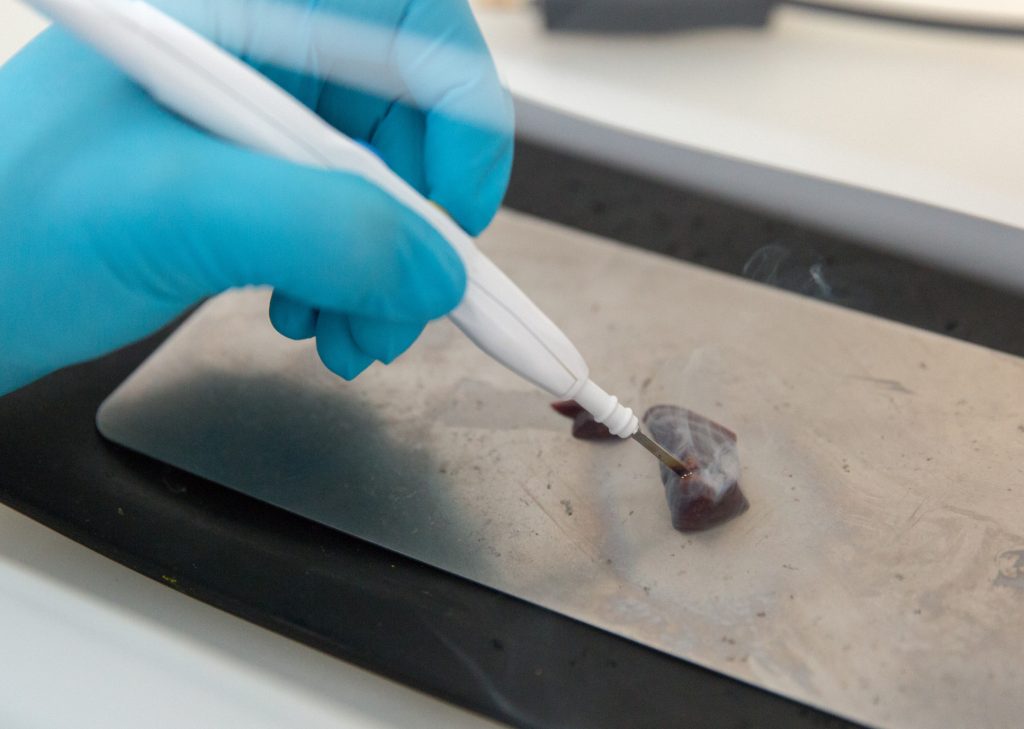Imperial College’s ‘iKnife’, which analyses cancerous tissues during surgery, is set to be tested on breast cancer patients.
The tool combines existing technologies in chemical analysis and medical engineering and could change the way that surgeons operate.
Dr Daniel Leff of Imperial College Healthcare is a breast surgeon working on the knife’s development and testing.
He said: “The hope is we’ll be able to reduce the number of women going back for further surgeries.”
This hope is contingent on a great many factors that can only be properly determined by extensive research which is just now getting underway.
Why breast cancer?
Breast cancer surgeons operate with a very fine margin for error.
While a mastectomy involves the removal of the entire breast, breast conserving surgery aims to remove only a small area around the tumour to minimise cosmetic damage.
Cutting too close to the tumour risks leaving cancerous cells in the body that can cause a recurrence, as the surviving cancer proliferates, while cutting further away from the tumour reduces this risk, but increases the amount of reconstructive surgery required.
The tumour is analysed after the surgery to identify that there are no cancer cells in the surrounding tissue, but this can take up to two weeks.
The rapid analysis that the iKnife could potentially provide may enable these judgements to be made before the surgery ends.
Leff said: “The hope is that you know near real time in order to adjust your surgery accordingly, whereas the current status quo is the patient finds out a week, ten days post surgery whether we need to go back or not.”
The present methods used for breast conserving surgery mean about 20-25% of patients in the UK need to go back for a second surgery, making methods to prevent this an important way of reducing the number of surgeries women need to undergo.
Statistics from Cancer Research UK, who are providing funding to the project, reported one in seven women in the UK will be diagnosed with breast cancer in their lifetime.
It is also the fourth most common cause of cancer death, making up 7% of cancer related deaths in 2018.

How does it work?
Modern surgeries often use electronic scalpels, because whilst a traditional scalpel cuts using a sharp edge, the electronic scalpel utilises an electric current to cut and cauterise tissues at the same time.

By cauterising the wounds before they can begin bleeding, the recovery time for patients is reduced.
The smoke released when the tissue is vaporised is what enables the iKnife to perform its chemical analysis, as the smoke is captured and examined with a mass spectrometer.
The chemical composition of the smoke is then compared to a database of cancers, and in the case of breast cancer, the proportion of fat in the cancer cells is different enough to be identified in the laboratory.
The different composition of the cancer cells is thought to be a result of their behaviour, as the rapid multiplication of cancer cells leads them to have a different proportion of these chemicals.
Leff stated that once the algorithm was trained, the model was able to produce a result in 1.8 seconds.
What are the barriers to using this technology immediately?
The current iKnife has largely been tested under laboratory conditions, cutting samples of preserved cancer tissue.
This could differ greatly to cancers in the human body, with the next phase of experimentation focused on finding out if it is still effective under real world conditions.
There is also the question of whether having access to this diagnostic information will improve patient outcomes, as the current form of the iKnife does not provide the diagnostic information to the surgeon holding the knife.
Leff said: “I don’t know if it’s good, bad or ugly. I just do the surgery as normal.”
A future version of the iKnife might be able to provide this data to the surgeon, but it’s not yet clear how to do this without distracting them from the surgery.
Leff anticipates any version that notifies the surgeon will require Randomised Control Trials, where a large number of people are assigned randomly to be treated with or without the experimental method.
This would allow for comparisons of the different feedback methods, whether they’re mechanical, audio or visual.
He added: “That’s an entire research field in its own right.”




